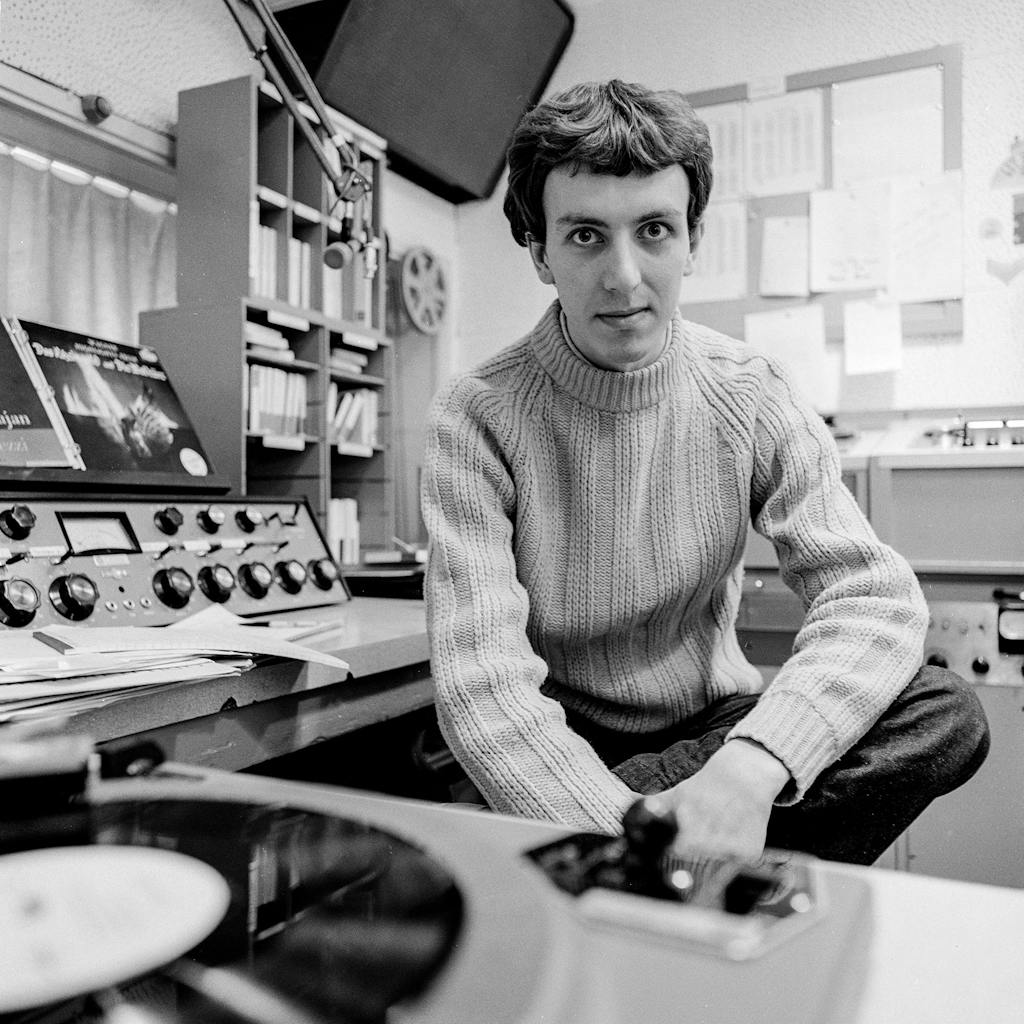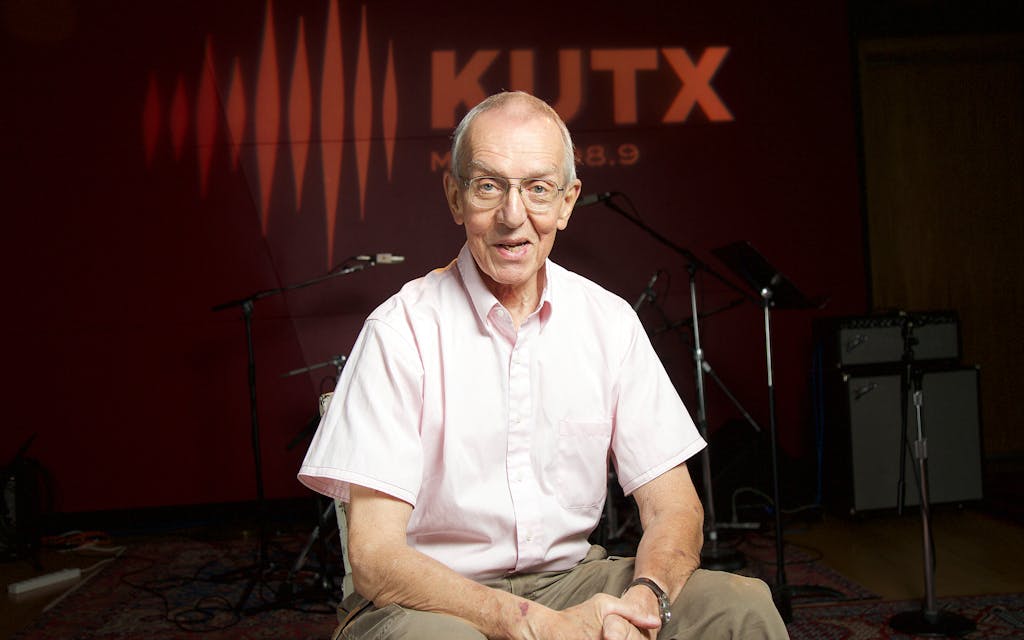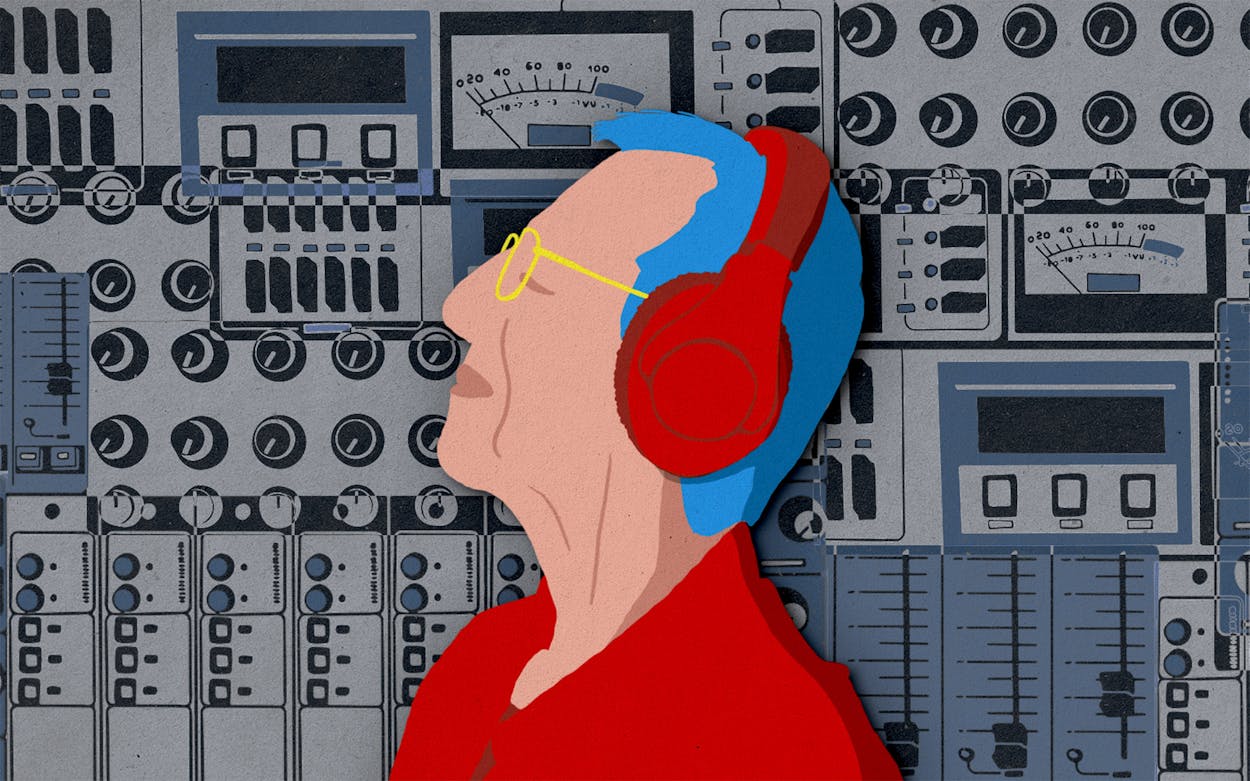You never knew what John Aielli was going to say. Or play. For more than fifty years, the idiosyncratic radio host on the Austin NPR affiliate KUT, and later KUTX, welcomed us into our mornings from the University of Texas campus. He could be poetic; he could be prickly. He took long pauses. He would most certainly go off on tangents that made sense only to him. He would mispronounce the name of famous singers and get even the most basic facts about a song wrong. And Austinites loved him, even if they did occasionally have to change the station out of frustration during his show, Eklektikos.
There’s a lot of debate over the city’s march toward homogeneousness, but for many of us, Austin stopped being weird when Aielli died at age 76. He left this world on July 31, 2022, but he had stepped down from his on-air duties after suffering a stroke two years earlier. This was all during the pandemic, of course, so many of us longtime listeners didn’t get a chance to say a proper goodbye.
Fans got much-needed closure Sunday at South by Southwest with the world premiere of Faders Up: The John Aielli Experience, the feature documentary, directed by David Hartstein and Sam Wainwright Douglas and produced by Blue Suitcase Productions. (The film will have a to-be-determined wider theatrical run, and later air on PBS and be available to stream.) Both the screening, at the Paramount Theatre, and the after-party, at Scholz Garten, felt like a wake, a celebration of life not just for a beloved radio personality, but for a version of Austin that no longer seems to exist.

Aielli was born in Ohio to jazz musicians, but he and his siblings grew up in Killeen. Home to Fort Hood (now Fort Cavazos), it wasn’t the easiest town for a closeted gay man, but he found his voice at the age of seventeen as a deejay on a local radio station, in 1963. (He was on the air when President John F. Kennedy was assassinated about 150 miles away.) The gig cemented his love of classical music, and although he harbored secrets dreams of being an opera singer in New York, he moved to Austin in 1966 to attend UT and found himself putting his deep baritone to use in a different way.
He debuted his six-hour (six-hour!) show, Eklektikos, in 1970, and for the next five decades became the voice of Austin’s mornings for thousands and thousands of listeners, including myself. When I moved here 24 years ago in the pre-Spotify era, I listened to his show not just for the unexpected mix of music—from current indie favorites and rock classics to opera arias and film scores—but to learn what was going on around town. The city’s self-appointed cultural ambassador, Aielli welcomed arts groups and nonprofits onto his show each day. He would mispronounce their names, accidentally play a song during the interview, and maybe give the wrong location or date, but I got the gist.
Those stumbles and technical malfunctions were a part of his brand, a word Aielli surely despised or at least was befuddled by. The doc’s title is a reference to how he never mastered the control board, keeping the faders (channel controls) down instead of up, resulting in the dead air that created his infamous long pauses between songs, called the “Eklektikos breeze” by staffers. In the film, we hear a few of those gems: Aielli mispronouncing Bono’s name and explaining that the U2 lead singer hailed from Detroit. The time he was so obsessed with the Titanic soundtrack, playing it several times in just one show, that a staff member had to hide it in a desk drawer. Aielli meditating on cherries and giving tips on how to buy them—he frequently gave soliloquies on food, gardening, and the weather.
His ramblings and non sequiturs were so legendary that a Twitter account, Shit John Aielli Says (@eklektikos), popped up in 2011 to record for posterity such nuggets as: “The way most people serve chicken fried steak is pathetic,” “Austin, Texas—an ever-expanding mushroom of glory,” and “Some of the laws of the universe are malleable . . . [fifteen seconds of silence]. This thing still isn’t working.” The account’s followers would occasionally shout out their own favorites, including some of his inspired playlists (from August 29, 2019: “I Put a Spell on You” by Diamanda Galás, “This Life” by Vampire Weekend, “Packin’ Up” by Marion Williams, followed by two Dinah Washington songs: “Teach Me Tonight” and “What a Diff’rence a Day Made.”)
The film is bolstered by the smart use of the rich Aielli/KUT archives—family photos, promotional material, staff videos, and interviews—as well as footage from Austin both past and present. We hear Aielli’s voice as the camera travels down neighborhood streets, viscerally evoking how so many of us listened to him as we drove to work and school. Images of long-gone businesses and the old modest skyline give way to photos of the high-rise city we barely recognize today.
But even if his voice was the soundtrack for so much of our lives, how well did we really know Aeilli? For such a public persona, he kept a very quiet, contained life. Hartstein and Douglas, who originally started out with a short project in mind before realizing they had something special, interviewed a thin, post-stroke Aielli in his tchotchke-filled home in the Cherrywood neighborhood about his life, his memories, and his love of music. Staff members and local arts leaders like the Austin Symphony’s Peter Bay shared personal stories, and one of Aielli’s surviving brothers and a sister-in-law fill in some of the blanks. We also learn that after his show each day, he would walk into his neighborhood cafe, Cherrywood Coffeehouse, with a green banker’s lamp in hand, head to a table, plug it in, and read a book in solitude.

The film also deftly handles the criticism Aielli received over the years and his resistance to change as the public radio station responded to the times and the needs of its membership audience. His show was shortened over time, eventually to three hours, and he had to play certain tracks on the station rotation (a mix of current songs and local acts) during each segment, which he did, reluctantly. I was shocked to learn that during one of the Christmas tree-lighting sing-alongs at the Capitol, which he led for years and which attracted thousands, a man dressed as a clown hit Aielli in the face with a cream pie, breaking his glasses and drawing blood. It scarred him deeply.
But no mattered how many of us hate-listened at times or complained when he went on too long, Aielli was ours. He belonged to the Austin of a certain era, one that welcomed and nourished artists, quirky personalities, and independence in all its forms. At one point in the documentary, musician and KUTX host Elizabeth McQueen mourns not only her beloved colleague, but the city in which he flourished and let him be himself, noting that a show like his would never find a home today. That helps explain why a few months after he died, hundreds of fans lined up for his estate sale, a lofty-sounding phrase for someone who was obsessed with thrift stores and filled every inch of his home with bric-a-brac, posters, lamps, books, and music. They all wanted something concrete to remember him by.
Faders Up’s beauty lies in its specificity. We hear only from Austinites, mostly coworkers and a few close friends, even though his legion of fans included some big names. One-time resident Robert Plant was one—a highlight of the film has to be when we see the Led Zeppelin leader meeting Aielli, who then proceeded to ask the singer if he was wearing a wig.
The film is a love letter to the deejay and to the city, but it resonates on a deeper and wider level. Time is always passing: It’s up to us to pay attention and appreciate what’s special. This feeling hung over the open-to-all afterparty at Scholz Garten, itself a part of Austin history. As KUTX staffers, filmmakers, friends, and family mingled on the patio around several photos of Aielli displayed on easels (as well as a life-size cutout, ideal for selfies), it felt like it could have been a beautiful spring day, the kind of day Aielli loved, twenty, even thirty years ago. Newer residents were there too, several of whom had known little if anything about Austin’s long-running radio host until the documentary. “Man, I feel like I really moved here too late!” one told me. But the city still contains magic. You just have to tune in.
- More About:
- Music
- Film & TV
- SXSW
- Documentary
- Austin








